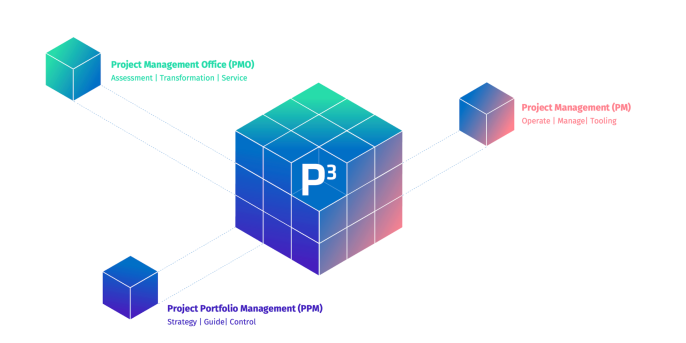4. September 2025 By Daniel Piosik
PMO as a Service: Flexible project support on demand
The Project Management Office (PMO) has long been an integral part of many companies when it comes to transparency, control and standards in project business. However, the demands for speed, flexibility and cost efficiency are constantly increasing – and traditional PMO structures often reach their limits.
PMO as a Service (PMOaaS) is a new model: project management expertise is no longer built up exclusively in-house, but can be used flexibly, scalably and as needed as an external service. This allows expertise and resources to be deployed precisely where they are needed – without lengthy set-up work or high initial investments.
A look at the practical application shows that adesso has already tested this model with various customers and gained valuable experience that shows when and how PMOaaS delivers real added value.
What is ‘PMO as a Service’?
PMOaaS transfers the services of a traditional PMO to a flexible, external service model.
Instead of permanently setting up internal structures, companies can draw on external PMO expertise on a project-specific or temporary basis.
Typical services in the PMOaaS environment are:
- Project setup and onboarding – commissioning resources, authorisation management and establishing ‘workable’ project team members.
- Reporting and monitoring – status, controlling budgets and risks in the project
- Support in day-to-day project work – coordinating appointments, planning resources, supporting PM/PMO tools, communicating with project team members and stakeholders
- Project procedures and results management – updating project plans, preparing steering committees, creating a project manual
The key difference: companies only pay for the services they actually need – scalable, flexible, on-demand.
Advantages of PMO as a Service
PMOaaS offers companies a range of advantages, especially for organisations that need to respond quickly and flexibly to project requirements:
- Cost efficiency – no high initial investments, billing based on usage
- Flexibility and scalability – capacities can be scaled up or down as needed
- Access to expertise – immediate access to experienced PMO specialists and best practices
- Rapid availability – support is available at short notice without lengthy internal set-up
In short, companies get PMO expertise on demand – exactly when and to the extent they need it.

IT transformation
Progress comes from the interplay of technology, organisation and strategy
Digital transformation is changing not only technologies, but also the way projects are managed and implemented. With ‘PMO as a Service’, companies can make the leap from reactive project support to becoming a strategic partner in transformation. The solution is flexible, scalable and tailored to the challenges of modern IT and business projects.
Find out more about how we support companies in transformation projects.
Challenges and risks of PMO as a service
Despite the advantages, there are stumbling blocks that companies should consider:
- Acceptance and culture – internal teams may react sceptically (‘outsourcing responsibility’)
- Integration into existing structures – processes, tools and governance must harmonise with the service model
- Dependence on the service provider – risk in the absence of internal expertise or know-how transfer
- Loss of internal anchoring – an external PMO is often less familiar with the corporate culture
- Change management necessary – transition requires clear communication, transparent goals and active stakeholder involvement
Success factor: PMOaaS should not be seen as an external service, but as an integrated partner of the organisation. Adesso has the necessary experience and offers proven process models that can be implemented efficiently and cost-effectively through nearshore approaches.
Best practices for successful implementation
Structured planning and close coordination with the organisation are crucial for PMOaaS to realise its potential:
- Clear goal definition – precisely define expectations and goals (e.g. for reducing workload, standardisation or scaling)
- Stakeholder involvement – ensure acceptance through early communication and active change management
- Start a pilot phase – test in a limited area before rolling out
- Regulate contracts and governance – define transparent SLAs, KPIs and responsibilities between the company and service provider
- Use hybrid models – a combination of internal core PMO and external services creates a balance between cultural knowledge and flexibility
- Continuous review – regular feedback loops to adjust scope, quality and service level
Practical insight
Experience from a customer project
Our pilot project showed that the introduction of PMOaaS is particularly successful when internal know-how and external expertise are closely integrated. The step-by-step introduction enabled us to:
- Meet the project management requirements for the PMO and deploy skills precisely where they are needed.
- Targeted relief for project management without diluting responsibilities.
- Improve the quality of PMO services and establish reliable services.
This experience confirms that PMOaaS is not just a theoretical model, but delivers clear added value in practice when its introduction is methodical and based on partnership.
How we support you with PMO as a Service
We help companies manage their projects more efficiently, transparently and successfully. With PMO as a Service, we provide exactly the support you need – flexible, scalable and on demand. Whether it's project setup, reporting or operational support, our experienced PMO experts bring structure and best practices to your project business and free you up to focus on what matters most: the successful implementation of your projects.
Conclusion & outlook
PMO as a Service enables companies to deploy project management expertise flexibly, efficiently and in line with their needs. The advantages are obvious: cost savings, rapid availability of expertise and scalable services. At the same time, companies must actively address challenges such as integration, change management and ensuring internal accountability.
Our experience shows that PMOaaS is particularly successful when internal knowledge and external services are closely integrated and clear structures for collaboration, reporting and governance are in place.
The future of PMOaaS will increasingly be shaped by hybrid models, digital tools and AI-supported project management functions. Companies that adopt flexible PMO models – such as agile or AI-supported digital PMOs – at an early stage can make their project landscape more agile, efficient and less risky, while at the same time reducing the workload on their teams.
We support you!
Whether you need short-term support for an ongoing project or want to set up a scalable PMO model for the future, our experts bring experience, structure and best practices to the table so that you can implement your projects faster, more efficiently and more successfully.

